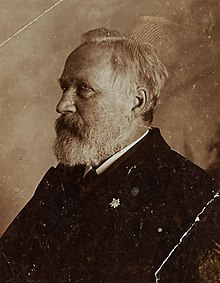Benedykt Dybowski | |
|---|---|
 | |
| Born | 12 May 1833 |
| Died | 31 January 1930 (aged 96) |
| Nationality | Polish |
| Alma mater | Friedrich Wilhelm University in Berlin |
| Known for | Discovery and classification of wide range of new Lake Baikal animals |
| Scientific career | |
| Fields | Limnology, zoology |
| Institutions | University of Lwów (Lemberg) |
| Thesis | Commentationis de parthenogenesi specimen |
| Doctoral advisor | C.B. Reichert |
Benedykt Tadeusz Dybowski (12 May 1833 – 31 January 1930) was a Polish[1] naturalist and physician.
Life
[edit]Benedykt Dybowski was born in Adamaryni, within the Minsk Governorate of the Russian Empire to Polish nobility. He was the brother of naturalist Władysław Dybowski and the cousin of the French explorer Jean Dybowski.
He studied at Minsk High School, and later medicine at Tartu (earlier Dorpat) University in present-day Estonia. He later studied at Wroclaw University and went on expeditions to seek and study oceanic fishes and crustaceans. He became a professor of zoology at the Warsaw Main School.[2]
In 1864 he was arrested and condemned to death for taking part in the Polish January Uprising. His sentence was later reduced to 12 years in Siberia.
He started studying the natural history of Siberia and in 1866 a governor Muraviov dismissed Dybowski from hard labour (katorga), renewed his civil rights and proposed him to work as a doctor in hospital.
He later settled in the small village Kultuk and began a detailed study of Baikal Lake with some technical support from the Russian Geographical Society. He served as a medical doctor for the indigenous population of Kamchatka, the Aleutian Islands, the Commander Islands, Bering Island, making four trips per year around the populated areas there.
After returning from Asia he continued research work at Lwów University (Lemberg). He was a president of the Polish Copernicus Society of Naturalists (1886–87).
In 1927 the Academy of Sciences of the Soviet Union elected Dybowski as a member-correspondent. Apart from that in 1921 Dybowski was given an honorary doctorate by the Warsaw's University, and in 1923 by the University of Wilno. On Dybowski's 95th birthday he was congratulated by the Shevchenko Scientific Society.
Dybowski spent the last years of his life in Lwów. Dybowski died at the age of 96. He is buried in Lwów (present-day Lviv) on the Łyczakowski Cemetery among the participants of the Polish Uprising of 1863.
Most of his collection of zoological and botanical specimens is now in the Lwów Zoological museum.
An amphipod (Gammaracanthuskytodermogammarus loricatobaicalensis), supposedly from Lake Baikal and named by him[3] was once considered the longest scientific name. However, that name is no longer considered valid.[4]
In February 2014, traveller Jacek Pałkiewicz unveiled a memorial plaque to Dybowski in Petropavlovsk-Kamchatski.[5]
See also
[edit]References
[edit]- ^ Iłowiecki, Maciej (1981). Dzieje nauki polskiej. Warszawa: Wydawnictwo Interpress. p. 164. ISBN 83-223-1876-6.
- ^ Wszolek, Zbigniew K.; Williams, Douglas P.; Kyle, Robert A. (1990). "Benedykt Dybowski—Physician, Explorer, Scientist, Political Prisoner". Mayo Clinic Proceedings. 65 (10): 1381. doi:10.1016/S0025-6196(12)62151-X.
- ^ Dybowski 1926 Bull. internat. Acad. Cracovie, (B) 1926:61.
- ^ "Opinion 105. Dybowski's (1926) Names of Crustacea Suppressed". Opinions Rendered by the International Commission on Zoological Nomenclature: Opinions 105 to 114. Smithsonian Miscellaneous Collections. Vol. 73. 1929. pp. 1–3. hdl:10088/23619. BHL page 8911139.
- ^ Pałkiewicz odsłania tablicę Dybowskiego na Kamczatce Archived 2015-06-08 at the Wayback Machine at Rzeczpospolita, 6 February 2014.
External links
[edit]![]() Media related to Benedykt Dybowski at Wikimedia Commons
Media related to Benedykt Dybowski at Wikimedia Commons
- Biography
- Curiosities of Biological Nomenclature: Wordplay
- The diary of Dr. Benedykt Dybowski from 1862 until 1878
- "Dybowski 1863" short movie by Maciej Pawlicki about the Dybowskis's arrest and the death penalty trial for taking part in the 1863 Polish January Uprising against the occupying Russian Empire at the Warsaw Main School while being the assistant professor there.
- 1957 Polish 2.50 zloty postage stamp with Benedykt Dybowski
- Benedykt Dybowski with his late-age daughter(archive.org)
- Retirement of Benedykt Dybowski from the Lwów University in Polish 1906 popular press